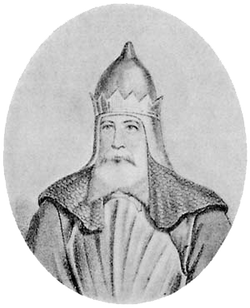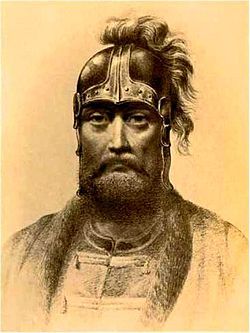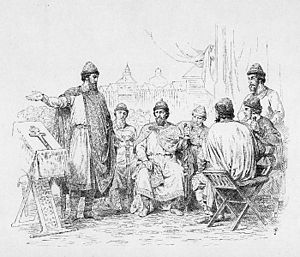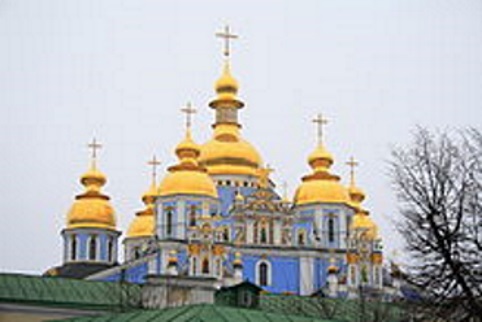Sviatopolk was the son of Iziaslav Iaroslavich by his concubine. Sviatopolk's Christian name was Michael. During his brother Iaropolk's life, Sviatopolk was not regarded as a potential claimant to the Kievan throne. In 1069 he was sent to Polotsk, a city briefly taken by his father from the local ruler Vseslav, and then he spent ten years (1078–88) ruling Novgorod. Upon his brother's death he succeeded him in Turov, which would remain in possession of his descendants until the 17th century.
When Vsevolod Iaroslavich died in 1093, Sviatopolk was acknowledged by other princes as the senior son of Veliki Kniaz and permitted to ascend the Kievan throne. Although he participated in the princely congresses organized by
Vladimir Monomakh, he is sometimes charged with encouraging internecine wars among Rurikid princes. For instance, he sided with his cousin David of Volhynia and his son-in-law Boles³aw III Wrymouth in capturing and blinding one of Galician princes. He also sided with Vladimir Monomakh in several campaigns against the Kypchaks but was defeated in the Battle of the Stugna River (1093).
Sviatopolk's Christian name was Michael, so he encouraged embellishment of St Michael's Abbey in Kiev, which has been known as the Golden-Roofed up to the present. The history now known as the Primary Chronicle was compiled by the
monk Nestor during Sviatopolk's reign.
Sviatopolk married firstly a Bohemian princess. They had three children: Zbyslava, Predslava and Iaroslav.
Secondly, in 1094 Sviatopolk married to a daughter of Tugor Khan of the Kypchaks, Olena. They had four children: Anna, Maria, Bryachislav and Izyaslav.
Sviatopolk was the son of Iziaslav Iaroslavich by his concubine. Sviatopolk's Christian name was Michael. During his brother Iaropolk's life, Sviatopolk was not regarded as a potential claimant to the Kievan throne. In 1069 he was sent to Polotsk, a city briefly taken by his father from the local ruler Vseslav, and then he spent ten years (1078–88) ruling Novgorod. Upon his brother's death he succeeded him in Turov, which would remain in possession of his descendants until the 17th century.
When Vsevolod Iaroslavich died in 1093, Sviatopolk was acknowledged by other princes as the senior son of Veliki Kniaz and permitted to ascend the Kievan throne. Although he participated in the princely congresses organized by
Vladimir Monomakh, he is sometimes charged with encouraging internecine wars among Rurikid princes. For instance, he sided with his cousin David of Volhynia and his son-in-law Boles³aw III Wrymouth in capturing and blinding one of Galician princes. He also sided with Vladimir Monomakh in several campaigns against the Kypchaks but was defeated in the Battle of the Stugna River (1093).
Sviatopolk's Christian name was Michael, so he encouraged embellishment of St Michael's Abbey in Kiev, which has been known as the Golden-Roofed up to the present. The history now known as the Primary Chronicle was compiled by the
monk Nestor during Sviatopolk's reign.
Sviatopolk married firstly a Bohemian princess. They had three children: Zbyslava, Predslava and Iaroslav.
Secondly, in 1094 Sviatopolk married to a daughter of Tugor Khan of the Kypchaks, Olena. They had four children: Anna, Maria, Bryachislav and Izyaslav.
Family Members
Advertisement
Explore more
Sponsored by Ancestry
Advertisement











